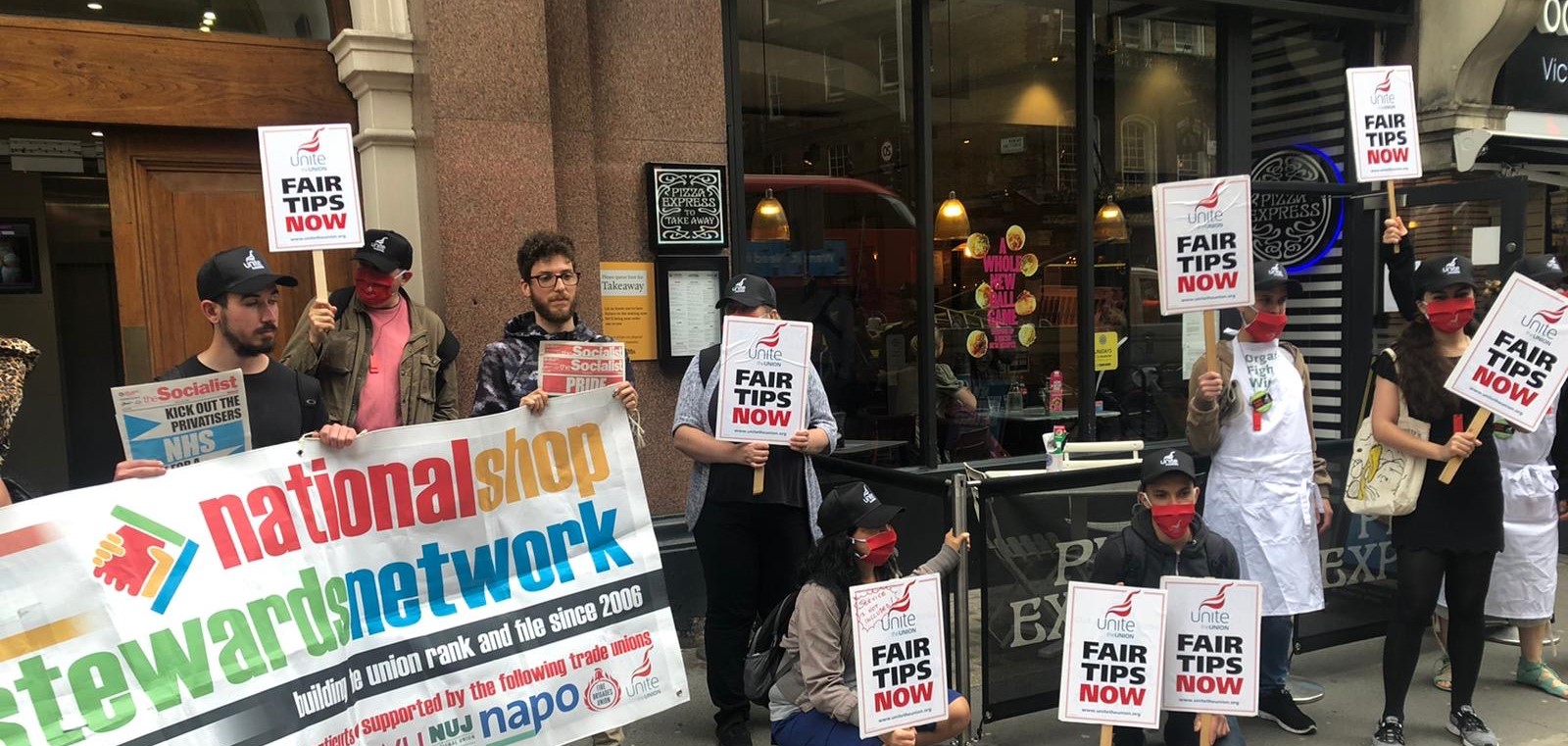Worst paid job in UK
Waiting tables is, according to the latest figures, the worst paid job in the UK.
The vast majority of waiters are on the minimum wage, barely eking out a living from profit-flush companies, even as the cost of living viciously climbs with each year.
If you’re a waiter at any restaurant, life is already a struggle, but if you’re a waiter at Pizza Express, you’re served with a double dose of injustice. At Pizza Express, the tips you earn aren’t all yours.
If a customer tips with a credit card, the pizza chain restaurant, along with a handful of other high street chains, pinches 8 per cent in admin fees from a waiter who’s already barely above the breadline.
This brazen theft amounts to an additional ÂŁ1m a year for a chain whose operating profits are currently ÂŁ55m.
Kieran has been a waiter for more than two decades, and he knows more than anyone how restaurants stiff their workers, often without customers’ knowledge.
At the Heathrow restaurant where Kieran currently works, waiters’ credit card tips are slashed by 30 per cent.
He was one of the dozens who attended two Unite-organised protests in central London today (May 21) to highlight the unfair tip practice, along with other common injustices waiters face, including low-pay and zero-hours contracts.
Kieran explains how times have changed over the past two decades, during which time wages have dropped and the cost of living has soared.
“About 15 years ago, my monthly travel card used to be £20 a month. You can’t even get that for a week now. My rent when I first came here to London was £450 for a three bedroom house in Southall. Now it’s £1,400. It’s more than trebled.
Wages fallen
“And my wages have decreased drastically,” added Kieran, who supports five children. “I used to work for a restauarant that gave us commission – if we brought in, say, ÂŁ1,000 a day, they’d give us 1 per cent. So I used to make a lot on commission. I used to make about ÂŁ27,000 11 years ago, and I looked at my P-60 last week, and it was ÂŁ18,000. My wages have fallen by nearly ÂŁ10,000 — and that’s not even taking into account the rise in the cost of living.”
Despite this, however, Kieran explains how the fortunes of he and his colleagues changed with union involvement. Before a campaign launched by Unite, employers were allowed to pay their waiters below the minimum wage, after which they’d top up their wages to the legal minimum with tips. In Kieran’s case, he was once earning £3 an hour. It’s a practice that’s common in America, but is now, thanks to union pressure, illegal here.
“Without the union you’re nothing,” said Duffy, who is now an active union member and negotiates on behalf of his colleagues.
“A Burmese waitress where I used to work once told me, â€Before you came here, we used to get ÂŁ94 a week maximum, now we’re getting at least ÂŁ200.’ I calculated that over the period of three and half years since that change, that amounts to ÂŁ18,000. And that was all because of the union — because the union supported us and we challenged management together.”
Kieran recalls his time working for a French restaurant, where a manager once viciously punched him, simply out of spite. This was the catalyst that inspired him to join a union.
“Now, when I negotiate with management with the union backing me, the managers treat me with respect; they’re polite to me,” he said. “These were the same people who years ago punched me and abused me.”
Unite regional officer Dave Turnbull, who spearheaded today’s protests, called the day of action “unfinished business” from Unite’s original fair tips campaign.
Campaign
“The main thrust of that campaign from a few years ago was to prevent employers from using tips to pay their workers the minimum wage,” he said. “It was perfectly lawful to do that at that time. So we started that campaign, we publicised the issue, we picketed a lot of restaurants and we got a lot of support from the media, particularly the Daily Mirror, and from the public. And it was successful – we managed to change the law.
“We highlighted many related issues at the time, including admin fees on credit card tips,” Turnbull added. “At the time, it was quite common for restaurants to charge anything between 8 and 15 per cent to process waiters’ tips. Fortunately since then, it has become less and less common.”
Turnbull said the aim of today’s protests was to expose Pizza Express and other restaurants, particularly in the Tragus Group which includes Café Rouge, for their claim that admin fees are still common practice.
Turnbull added that support from customers was absolutely essential in affecting change.
“When you do leave a cash tip, make a point of asking to speak to the manager and say to him categorically, â€The reason I’m leaving this cash tip is because I object to the company taking 8 per cent of the waiter’s tip’,” he said.
“We saw this in our original fair tips campaign – pressure from the customers is just as effective as us picketing restaurants. It’s both a workers’ and consumers’ issue — to make sure that these companies do right by both.”
As the fight for justice for waiters continues, Turnbull urged more restaurant workers to organise and fight back for their rights.
“Union membership is confidential,” he said, noting that waiters and other hospitality workers have nothing to fear and nothing to lose from joining. “If you decide to join a union, your employer doesn’t have to know if you don’t want them to.
“You can’t afford to be in the workplace without a union today,” Turnbull went on to say. “We now have employment tribunal fees and other continued attacks on workers’ rights – the only protection workers have got now is through their trade union.
“It’s like house insurance – you wouldn’t leave your house without insuring it.”
 Like
Like Follow
Follow



